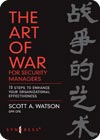The Inevitability of Conflict

Security professionals must accept the fact that conflict is a normal part of their professional and personal lives. Far from being an unnatural phenomenon that must be either avoided at all costs or waged with the goal of absolute destruction, conflict can be beneficial.
Those who manage conflict well obtain efficient victories; those who fail to manage conflict well exhaust their resources and are eventually defeated.
How we and others view conflict is largely based on how we answer some fundamental questions about life and human nature.
- What is the natural state of human beings?
- Are people basically good or basically evil?
- Is life about cooperation or competition?
- Differing objectives
- Limited resources
- Position and influence
- Interpersonal matters
Is it then surprising that conflict should shape our day-to-day lives? Who has ever seriously dreamed of accomplishment without struggle or riches without work? Does any human being have unlimited resources? Is any organization completely secure? The reality is that conflict is inevitable. As security professionals, we can either accept that fact and prepare, or ignore reality and continually be defeated.
To begin to understand the nature of conflict, we must first answer some basic questions about life and the nature of human beings.
WORLD-VIEW AND CONFLICT
What is the natural state of human beings? Are people basically good or basically evil? Is life about cooperation or competition? These questions reveal much about one’s world-view and, by extension, the need to study conflict.On one extreme are those who have not been exposed to significant security-related conflict. Based on their experience they are, not surprisingly, under the impression that conflict is unnecessary. This outlook makes them prone to ignore warning signs about possible danger and blame societal forces for “making” otherwise “good” people victimize others.
Does this sound familiar to you? As a security manager it’s very likely that you’ve encountered people who hold this world-view. These are often the same people who deny the possibility that intentional malicious acts could be directed against your organization. Since the threats that you are warning them about fall outside their direct experience, it is difficult (but not impossible) to convince them.
At the other extreme are those for whom conflict has become a way of life. These people view the world as a zero-sum game in which winners win by denying others their legitimate needs. They create conflict where it can be avoided, and they expend resources in a never-ending series of pyrrhic battles. As a security professional, this attitude may also sound familiar to you. Potentially violent employees, customers or contractors often display remarkably similar views as those expressed above. These people will often blame others for their own shortcomings, have elevated frustration with the environment, exhibit paranoid behavior, and engage in socially unacceptable behavior toward others. Even if one never becomes violent, this extreme world-view and accompanying ideology surrounding conflict can cause disruptions of business and decreased morale.
The first world-view, if taken to its logical conclusion, results in an irresponsible lack of vigilance and victimization. The second world-view inevitably leads to anger, arrogance and destruction. Thankfully there is a middle ground.
As the opening quote “The Inevitability of Conflict” clearly indicates, Sun Tzu readily understood that conflict in the form of military action was essential to the survival and security of the state. In Sun Tzu’s view, the nation that systematically studied and applied strategy would not only survive the challenges of hostile competitors, but would flourish. Conversely, the nation that failed to make a systematic study of military matters would find itself the captive of larger, more powerful enemies.
The strategically minded security professional is in much the same position. By constantly assessing threats to the organization and devising countermeasures that use as few resources as possible, the security professional can effectively counter legitimate threats without causing unnecessary conflicts and the accompanying drain of resources.
About business world conflicts, every security professional knows that the business world has no shortage of conflicts. Whether these conflicts are internal or external in nature, they can generally be divided into four categories: conflicts over objectives, conflicts over resources, conflicts over influence and interpersonal conflicts.
CONFLICTS OVER OBJECTIVES
Conflicts originating out of differing or opposite objectives are very common. For a security professional, the most obvious example is manifested in his or her mandate to prevent organizational losses. Criminals who seek to steal, defraud or damage organizational assets have exactly opposite objectives from those of the security manager. This type of conflict is unavoidable; much of the reason for having a security department is to prevent and/or mitigate losses.Other objective-oriented conflicts can be more subtle. Take a bank branch, for example. In an effort to prevent robbers and irate customers from jumping the counter and assaulting employees, the bank’s security department may want to install teller line barriers from floor to ceiling. Conversely, the bank’s safety department may want to have lower barriers with open teller stations in order to reduce the number and severity of repetitive motion claims on the part of employees. Finally, the marketing department may want to eliminate barriers altogether in an effort to make the branch appear friendlier and more inviting to customers. Depending on where one sits within the organization, any of these objectives can seem reasonable. It is therefore incumbent upon the security professional to learn as much about the objectives of other departments as possible. Doing so will enable creative solutions to be developed.
CONFLICTS OVER RESOURCES
A classic business example of resource conflict is the annual budget process. Since businesses have limited resources, executive management has to decide how to allocate available funds in such a way as to make the firm most profitable. Budget allocations directly translate into new equipment, additions or deletions to staff, training, travel and other critical department needs. As a result, resources conflicts are common.The strategically minded security manager will learn to quantitatively align his or her department’s objectives and proposed resource allocation with those of the firm.
CONFLICTS OVER INFLUENCE
Conflicts arising out of a struggle for influence are also common in the business world. At a certain level within all organizations, there are managers who seek to have their vision for the firm translated into action. The extent to which one has the ability to have this vision implemented by those who hold power is a measure of influence. As a security professional, the development of influence with strategic policymakers is the key to success.INTERPERSONAL CONFLICTS
Interpersonal conflicts are most often based on lack of effective communication, pride and emotionalism. As a result, they can provoke some of the most costly battles in business and should therefore be avoided if at all possible. When someone allows pride and raw emotionalism to control their actions, they are likely to make decisions that, under normal circumstances, they would never consider. Interpersonal conflicts may result in loud, disruptive arguments, acts of covert sabotage and even acts of violence.
The Art of War for Security Managers applies principles of Sun Tzu’s theories of conflict to contemporary organizational security.
THE SECURITY MANAGER AND CONFLICT
Security professionals generally understand that conflict with criminals and other traditional threat vectors is part and parcel of the field. What many professionals fail to see is the fact that conflict isn’t always overt and doesn’t always involve traditional security issues. Most often, security professionals will find themselves in conflict with other departments over influence, resources or objectives. At other times, the conflict may be trying to convince senior management that the best course of action is the one being recommended by the security manager. At yet other times, the conflict may be interpersonal and involve smoothing over relationships.In order to successfully manage conflict at all levels, the security professional needs to:
- Accept the inevitability of conflict.
- Understand that conflict is not necessarily bad.
- Make a systematic study of conflict typologies and decide how they apply to the operational environment.
- The investigations group thought that those in operations were inexperienced and, therefore, not as professional as their own personnel. As a result, they distrusted the operations group. This showed when the groups had to work together.
- The operations group looked upon the investigations personnel as being aloof, arrogant, and uncooperative. As a result, they looked for opportunities to show up the investigations group.
- The information security group had very little dealings with the operations group and distrusted the investigations group. As a result, information security was slow to provide the requisite data needed to pursue cases.
SIDEBAR: Rivalries and How to Manage Them
On the rare occurrences when employees transferred from one group to another, they soon find themselves not accepted by their new group and treated as traitors by their old group. As time passed, these rivalries resulted in critical mistakes that reflected on the entire corporate security department. Eventually, the department was reorganized, and several positions were eliminated.How would you characterize these conflicts? Are they conflict of objectives, conflict of resources, conflict of influence or interpersonal conflicts? Why?
If you were the chief security officer of this organization, what steps would you take to overcome the situation described above?
If you were an employee who just transferred from one department to another, how would you become accepted by your new colleagues, while still maintaining a good relationship with your former colleagues?
Looking for a reprint of this article?
From high-res PDFs to custom plaques, order your copy today!




